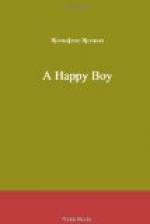The same summer his mother undertook to teach him to read. He had had books for a long time, and wondered how it would be when they, too, should begin to talk. Now the letters were transformed into beasts and birds and all living creatures; and soon they began to move about together, two and two; a stood resting beneath a tree called b, c came and joined it; but when three or four were grouped together they seemed to get angry with one another, and nothing would then go right. The farther he advanced the more completely he found himself forgetting what the letters were; he longest remembered a, which he liked best; it was a little black lamb and was on friendly terms with all the rest; but soon a, too, was forgotten, the books no longer contained stories, only lessons.
Then one day his mother came in and said to him,—
“To-morrow school begins again, and you are going with me up to the gard.”
Oyvind had heard that school was a place where many boys played together, and he had nothing against that. He was greatly pleased; he had often been to the gard, but not when there was school there, and he walked faster than his mother up the hill-side, so eager was he. When they came to the house of the old people, who lived on their annuity, a loud buzzing, like that from the mill at home, met them, and he asked his mother what it was.
“It is the children reading,” answered she, and he was delighted, for thus it was that he had read before he learned the letters.
On entering he saw so many children round a table that there could not be more at church; others sat on their dinner-pails along the wall, some stood in little knots about an arithmetic table; the school-master, an old, gray-haired man, sat on a stool by the hearth, filling his pipe. They all looked up when Oyvind and his mother came in, and the clatter ceased as if the mill-stream had been turned off. Every eye was fixed on the new-comers; the mother saluted the school-master, who returned her greeting.
“I have come here to bring a little boy who wants to learn to read,” said the mother.
“What is the fellow’s name?” inquired the school-master, fumbling down in his leathern pouch after tobacco.
“Oyvind,” replied the mother, “he knows his letters and he can spell.”
“You do not say so!” exclaimed the school-master. “Come here, you white-head!”
“Oyvind walked up to him, the school-master took him up on his knee and removed his cap.
“What a nice little boy!” said he, stroking the child’s hair. Oyvind looked up into his eyes and laughed.
“Are you laughing at me!” The old man knit his brow, as he spoke.
“Yes, I am,” replied Oyvind, with a merry peal of laughter.
Then the school-master laughed, too; the mother laughed; the children knew now that they had permission to laugh, and so they all laughed together.




